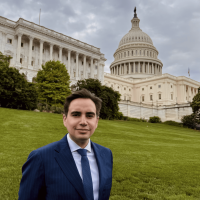During the third Mexican presidential debate, candidate Claudia Sheinbaum –favorite to win the presidency– suggested the “total elimination of plurinominal representatives.” This specific proposal poses a significant threat to Mexico's fragile democracy and the representation of its political minorities.
Mexico has a mixed legislative electoral system, combining elements of a first-past-the-post system with proportional representation. The Mexican Chamber of Deputies has 500 seats, 300 of which are elected through a first-past-the-post system. The remaining 200 seats are allocated through a system of proportional representation based on the national vote percentage each party receives in the deputies' election; these are the plurinominal deputies. Similarly, the Mexican Senate consists of 128 seats, with three senators elected from each of the 31 states and Mexico City: two from the party with the most votes and one from the second-place party. Additionally, 32 senators are elected through proportional representation.
Proportional representation was introduced in Mexico as part of democratization efforts in the late 20th century to provide political inclusion to leftist minority parties that emerged from the social movements of 1968 and the early 1970s. Key reforms in 1977, 1986, 1990 and 1996 established proportional representation in the Chamber of Deputies and the Senate, ensuring that minority parties could participate in the legislative process. This helped create a balanced political environment, promoting negotiation and compromise.
From 1997 to 2018, proportional representation enabled minority parties to act as significant legislative counterweights, preventing presidents from having an absolute majority in the Chamber of Deputies. These reforms reinforced the constitutional division of powers, essential for democratic governance. Without proportional representation, Mexico risks reverting to a hegemonic party system, marginalizing minority voices, and undermining democratic processes.
The proposed elimination of plurinominal representatives threatens these critical reforms, risking a return to hyper-presidentialism and diminished legislative checks on executive power. In the past, Presidents Calderón, Peña Nieto, and López Obrador have proposed similar initiatives threatening democratic representation. Now, presidential hopeful Sheinbaum is following suit.
Plurinominal representatives are crucial because they ensure that minority parties –and their voters– have a voice in Congress, thus cultivating political plurality, an indispensable concept of liberal democracy. Without plurinominal representatives, majority parties would be overrepresented, distorting the electorate’s true will.
For example, in the federal election of 2012, the PRI and its allies won 40% of the national vote. Nevertheless, without plurinominal representatives, President Peña Nieto’s ruling coalition would have held 59% of the seats in the Chamber of Deputies. In 2018, Morena and its allies won 43.5% of the votes, but President López Obrador’s coalition would have held 73% of the deputies without plurinominal representatives. In both cases, the ruling coalitions would have been provided with legislative supermajorities that did not reflect the will of the Mexican electorate.
Eliminating plurinominal representatives only benefits the majority party, the party in power. It is hypocritical for a movement that has historically benefited from proportional representation—like AMLO and Sheinbaum’s—to propose such an elimination. The inclusion of plurinominal representatives was a major milestone in the democratization process of Mexico. Without them, the left would have hardly gained representation, and achieving a democratic transition would have been more difficult.
The intent to eliminate plurinominal representatives today reflects a nostalgia for a time when a single party could control Congress without majority citizen support. This move reflects Morena’s aspirations to return to a single-party, hyper-centralized regime lacking adequate checks and balances.
Proposals to eliminate plurinominal representatives should be viewed with caution, as they threaten to undermine the democratic principles that allow for diverse representation and fair governance. As Mexico approaches its 2024 elections, it is more important than ever to protect these democratic institutions and ensure that all political voices are fairly represented.
Author


Mexico Institute
The Mexico Institute seeks to improve understanding, communication, and cooperation between Mexico and the United States by promoting original research, encouraging public discussion, and proposing policy options for enhancing the bilateral relationship. A binational Advisory Board, chaired by Luis Téllez and Earl Anthony Wayne, oversees the work of the Mexico Institute. Read more

Explore More
Browse Insights & Analysis
Greenland’s New Governing Coalition Signals Consensus

The Future of France's Far-Right Party

Ukrainian Issue in Polish Elections

